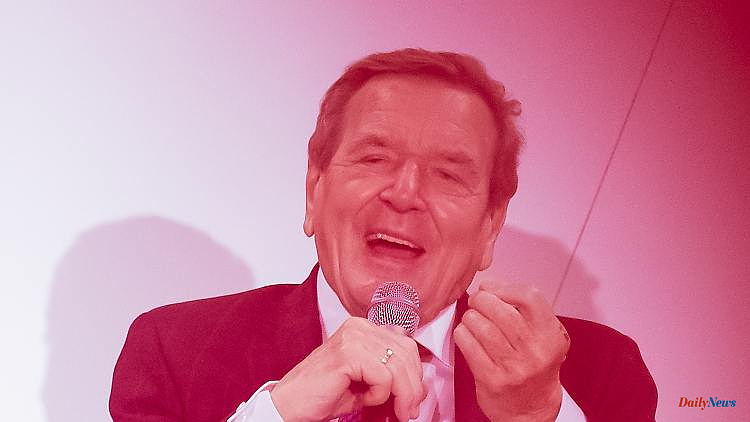After his reign, the charismatic former chancellor could have risen to become a respected elder statesman. Instead, he keeps falling down the ladder of public esteem. It's true that he's losing his public office funds, but that's no cause for celebration.
The ancient Greeks would have been delighted with the not-so-old Gerhard Schröder. The epic about the half-orphan who, with his own wit and stubbornness, makes it from the poorest background to the most powerful man and then suddenly falls, is classic ancient heroic material. And it is one thing above all: a human tragedy. It is almost certain that the Bundestag will withdraw the funds for his own office from the 78-year-old on Thursday because the former head of government no longer fulfills the duties of a former chancellor. The privileges of former chancellors were disputed even before the Russian invasion of Ukraine. The justification for the decision is only a pretext for the real reason for the sanction: Schröder's unbroken close relationship with the Russian autocrat Vladimir Putin and his work for Russia's state-owned gas giants Gazprom and Rosneft.
The former SPD chairman and his wife Soyeon Schröder Kim, who closely accompanied him, missed the very last chance for Schröder's personal rehabilitation in February. But even a complete break with his friend Putin and an end to all mandates for Russian companies would not have made up for the fact that Schröder, like no other, glossed over the deteriorating human rights situation in Russia and relativized the illegal annexation of the Ukrainian peninsula of Crimea. However, his commitment to Moscow treating Germany as a premium customer for its raw material exports was more than right for the SPD, the Union and the leaders of German industry up to the turn of the year. As much as Germany's focus on Russian gas, coal and oil has slowed down the energy transition, the economy and consumers have benefited from the comparatively cheap energy sources in the short term.
Schröder pointed out this fact in a sensational interview with the "New York Times" at the end of April: Germany's dependence on Russian raw materials has many mothers and fathers. Schröder is only the best-known of them, and above all the one who shamelessly used his part in this policy for his own financial gain. But saying "mea culpa", an admission of guilt, is not his thing, Schröder explained. He is more likely to accept that the war criminal in the Kremlin is his last remaining friend than to betray him by clearly distancing himself: at least that's how Schröder seems to see it. His very own principles are the dark side of that fighting spirit with which he once marched through all the institutions up to the chancellor's office and laid down an all in all successful reign there.
Because the red-green federal government was a real coalition of new beginnings after the leaden Kohl years. In terms of environmental and social policy, both parties got Germany on track around the turn of the millennium. Despite all the hardships and mistakes, the agenda reforms were also fundamentally correct and the basis of the economic rise of the Federal Republic under the subsequent Merkel governments. The fact that Schröder and his Foreign Minister Joschka Fischer kept Germany out of the illegal US invasion of Iraq is a historic achievement. The then opposition leader Angela Merkel had campaigned for more transatlantic loyalty, while Fischer in the UN Security Council demystified the alleged US evidence of Iraqi weapons of mass destruction as fabricated.
The entertaining, opinionated Schröder, who dominates folk festivals and beer banks as well as board meetings and star dinners, could have become a popular former chancellor with this record. A strong, public voice and political special envoy for sensitive mediation missions - which he has always done without making a fuss about it. Without his connections to Russia, Schröder, with his talent as a people's tribune, would today be a sought-after and internationally recognized elder statesman. Since his predecessors have been dead for a long time now, the stage would have belonged entirely to him and he would not have become poor in the process.
But with his stubbornness, his vanity and his apparent belief that the country owes him more than the other way around, Schröder has robbed himself of this well-deserved inheritance. Instead, the old and new federal governments kept him at a distance. The fact that Schröder is said to have drunk "copious amounts of white wine" during the "New York Times" interview fits into the image of a man who has long been unhealthy and that observers in Berlin have of him. It is said that Schröder has not become more accessible in recent years.
After Schröder forestalled the loss of honorary citizenship in Hanover, the SPD examined several applications for expulsion from the party, and his entire party distanced himself from him as much as possible . Schröder fell deeper than his predecessor Helmut Kohl, who was involved in the criminal CDU party donation scandal. As Chancellor and probably also afterwards, Kohl equated the well-being of the CDU with the well-being of the country. Former Chancellor Schroeder, on the other hand, has put his own interests above the interests of the Federal Republic - even if it's just his insistence on not letting anyone tell him anything.
This is how the former hero Gerhard Schröder fell from the highest heights at the end of his miraculous ascent, also because he had lost his grip on the ground. In the ancient myths, at this point in the story, the gods in Olympus were writhing with laughter. But there is no reason for mockery and satisfaction. The temporary end of this tragedy is just sad - for the SPD, for Germany and also for Gerhard Schröder.
6












